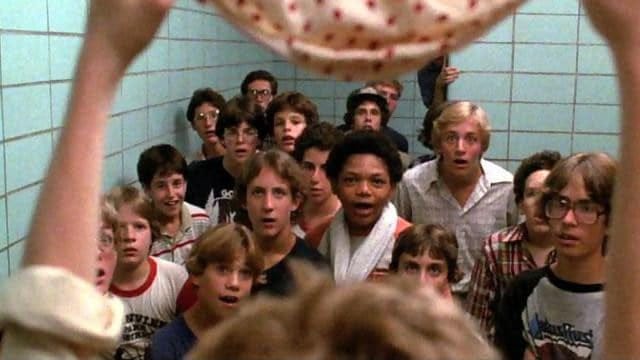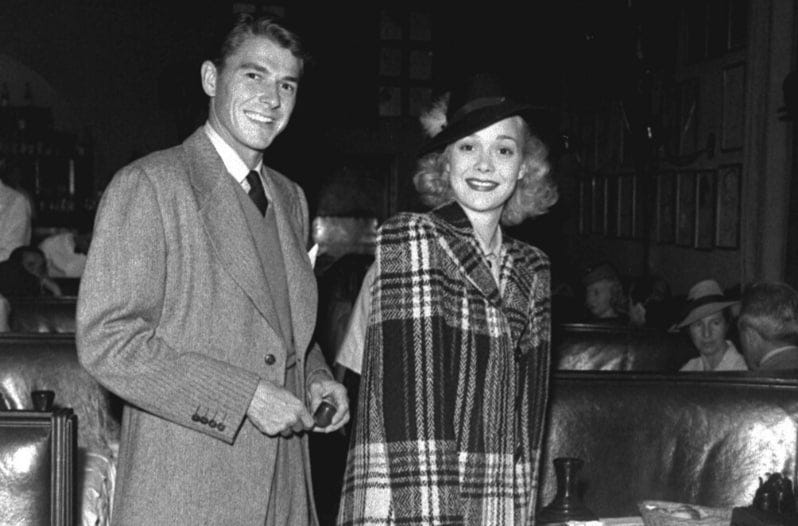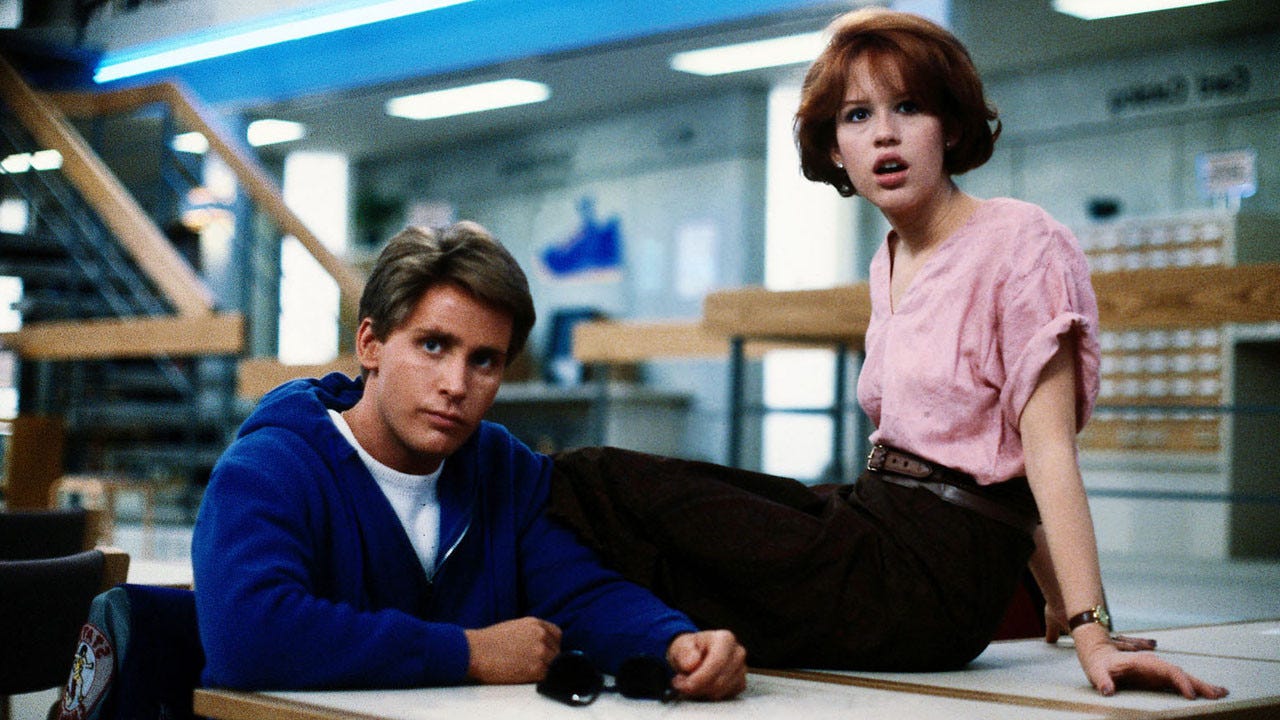In 1996, my parents, Marianne and Robert, married at Glencoe Union Church. Best known as the church from Sixteen Candles (1984) when Molly Ringwald’s sister gets shitfaced on muscle relaxers and stumbles down the aisle to her douche-bag fiancé. They’re getting married, not because they’re madly in love, but because it seems to be the thing to do (such is the Reagan era of “family values,” but we’ll get to that). My mother and I bought the Sixteen Candles DVD from the half-price bin in Walmart and watched it on repeat for years. I have seen it more than possibly any other movie, if only for the line, “Fresh breath’s a priority in life.” Oh, to be a lowly sophomore catching the interest of hunky senior Jake Ryan via a radioactively embarrassing note confessing your love (also, why did he pick it up off the ground when it was so obviously not meant for him?—Mind your fucking business, kid!).
Hughes might have had an ear for the adolescent psyche, but the ‘Long Duck Dong’ and rape-y shit played for laughs looks even worse as an adult. It seems, particularly in Sixteen Candles, to be a one-to-one ratio between ugliness and genuine humor. On the one hand, harmful and pernicious racism is embedded in the film, and then on the other, baby John and Joan Cusack! Additionally, Hughes seemed to understand the minutiae of teenage girlhood more than any male filmmaker of his time or, honestly, in the thirty years thereafter (a notable exception is Bo Burnham’s directorial debut, Eighth Grade). But your mileage may vary, and the mental gymnastics required to justify this film become more impossible every day.
Molly Ringwald’s 2018 New Yorker essay about her director-muse collaboration with Hughes recalls the scene when the male love interest’s doomed girlfriend, Caroline, gets pawned off on the Geek for a pair of underwear while she’s blackout drunk. “The Geek takes Polaroids with Caroline to have proof of his conquest; when she wakes up in the morning with someone she doesn’t know, he asks her if she ‘enjoyed it.’ (Neither of them seems to remember much.) Caroline shakes her head in wonderment and says, ‘You know, I have this weird feeling I did.’ She had to have a feeling about it, rather than a thought, because thoughts are things we have when we are conscious, and she wasn’t.”
Regarding a piece Hughes wrote in the October 1980 issue of National Lampoon entitled “Sexual Harassment and How to Do it!” Ringwald reached out to the piece’s co-author, Ted Mann, who most recently wrote for and co-produced Showtime’s Homeland. “He replied that he didn’t remember ever having written it. ‘It looks like one of our art director Peter’s desperate page fillers,’ he explained, referring to Peter Kleinman. ‘It wouldn’t fly today and it never should have flown then,’ he went on, adding, ‘These were degenerate cocaine days.’” You often wonder how much ugliness of the 80s has been explained away by cocaine and its “degenerate” effects. How much of the 80s was a base reaction from cis, white men in power to the growing racial parity and “women’s lib” of the sixties and seventies. As time goes on, it becomes increasingly difficult to believe our heroes were really ever on our side.
For all his work purported to favor the “underdog,” Hughes’ politics were pro-capitalist through and through, and while his films might have been set in Cook County, he only ever depicted a razor-thin, very well-off slice of it. Growing up, I’d pass Hughes’ Tudor-style monstrosity in Lake Forest every time I was dropped off at my friend’s house. He also is an alumnus of Glenbrook North High School (then Glenbrook High), the scholastic setting of two of his greatest hits, The Breakfast Club (1985) and Ferris Bueller’s Day Off (1986), and my would-be alma mater if my family hadn’t jumped ship for Texas in early adolescence. For me, Hughes’ oeuvre is inextricably linked to childhood—even synonymous with adolescence itself. As children of the Chicago North Shore, my mother and I were destined to follow our hometown hero wherever he may lead.
When I was younger, I fixated on my grandmother’s rose garden backyard and how it looked remarkably similar to something out of one of those backyards from Ferris Bueller’s Day Off. These days, I can only recall the headache-inducing smell, the screened-in patio, and how well over a decade ago it was bulldozed and flipped into some gaudy monstrosity. As anyone who has faced the physical remnants of one’s childhood can tell you, nostalgia’s a tricky thing—trickier, even, than heroes. It doesn’t take much stretch of the imagination to think John Hughes would’ve hated me for my Socialist principles and reverence for early twentieth-century Russian theatre. I’m not convinced about half of white men born before 1980 wouldn’t, if given a chance, spit on my shoe and call me “commie scum.” I can only enjoy John Hughes when I take away the fact that he released The Breakfast Club in 1985, when six years later, a world away, Angels in America premiered and four months previous, Ronald Reagan was inaugurated as the 40th President of the United States.
If we’ve learned nothing from the last five years, can’t we find it in ourselves to finally disavow the existence of fiscal conservatism? After all, what difference did your tolerance make in a world where queer folks dropped like flies from crowbars and guns and invisible disease? Where did the tax cut come in when Reagan disavowed his countrymen? When his greatest political regret had nothing to do with his abandonment of poor populations and willful ignorance of a then-unprecedented pandemic, but regarding his “no-fault” divorce laws in California during his reign as governor, I can hardly be surprised.
Personally motivated by his own messy divorce in 1948 from the actress Jane Wyman, the legal bind between husband and wife became practically non-existent, and people could just break up without undue cruelty to one another (the horror!). Following the social revolution of the 60s and 70s, when women were leaving unhappy marriages and staying in the workforce for longer, along with the semi-dissolution of segregation and rampant optimism pre-recession, the American swing took full effect. It ushered in a shiny, long-lasting brand of conservatism that was dominant even through the Clinton era. All of America’s best ideas curdled into empty promises, and Reagan wielded middle-class aspirations for a higher tax bracket to eventually vanish the group altogether.
I wonder if John Hughes would have remained in obscurity if his plucky “underdog” heroes didn’t feel so much like future CEO-success stories at the precise moment when we craved consumerism above all else; Capitalism had won, and Wall Street and a burgeoning technological sector were all that mattered. As Slate’s Micheal Weiss wrote in 2006, “Even those dismayed by the cheap sentimentality and wafer-thin plotlines of his films could at least appreciate seeing class presented as not something you skipped but were defined by.” John Hughes understood, perhaps better than anybody, the power of youth and class in America.
I think of Mom and Dad, marrying in a church they only passively believed in and dancing at the Winnetka Country Club, purchasing the ring and fitting the white dress, receiving gifts from every relative imaginable only to end up unhappy. I can hardly believe this is all marriage amounts to, just as I cannot believe Jane Fonda smoking weed in 9 to 5 inspired the Reagans to incite the War on Drugs (spoiler: Jane Fonda is not to blame, it’s racism again). I’m sure their vows felt like theirs and theirs alone, that they were the only ones in the world to make those same promises, and getting married had nothing to do with the fact that they were in their 30s and wanted a home and Dad wanted a baby.
In 1996, there was no socially viable way for two college-educated individuals to live together, raise a baby, to share a life (and anyway, marriage seemingly only benefits the professional class, and almost every conservative value benefits them). I’m sure at the time they meant it, just like I’m sure John Hughes thought non-consensual sex from the perpetrator’s perspective was “hilarious” and “totally relatable!” and Long Duck Dong was a really solid running bit with no harmful ripple effects. I wonder what I might have thought of The Breakfast Club if I hadn’t moved away from our hometown before I was old enough to really experience it; if I would’ve been disappointed by the ordinariness of it all.
Molly Ringwald showed her ten-year-old The Breakfast Club. If I ever have a daughter, I’m not sure I'll do the same for mine.
P.S. I had a minor obsession with the 80s in high school. I’d tell you my Tumblr username, but I’d like to keep my job (if you know… you know).









